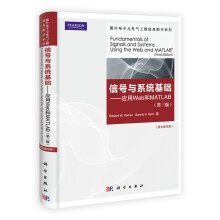Preface
CHAPTER 1 Fundamental Concepts
1.1 Continuous-Time Signals
1.2 Discrete-Time Signals
1.3 Systems
1.4 Examples of Systems
1.5 Basic System Properties
1.6 Chapter Summary
Problems
CHAPTER 2 Time-Domain Models of Systems
2.1 Input/Output Representation of Discrete-Time Systems
2.2 Convolution of Discrete-Time Signals
2.3 Difference Equation Models
2.4 Differential Equation Models
2.5 Solution of Differential Equations
2.6 Convolution Representation of Continuous-Time Systems
2.7 Chapter Summary
Problems
CHAPTER 3 The Fourier Series and Fourier Transform
3.1 Representation of Signals in Terms of Frequency Components
3.2 Trigonometric Fourier Series
3.3 Complex Exponential Series
3.4 Fourier Transform
3.5 Spectral Content of Common Signals
3.6 Properties of the Fourier Transform
3.7 Generalized Fourier Transform
3.8 Application to Signal Modulation and Demodulation
3.9 Chapter Summary
Problems
CHAPTER 4 Fourier Analysis of Discrete-Time Signals
4.1 Discrete-Time Fourier Transform
4.2 Discrete Fourier Transform
4.3 DFT of Truncated Signals
4.4 FFT Algorithm
4.5 Application to Data Analysis
4.6 Chapter Summary
Problems
CHAPTER 5 Fourier Analysis of Systems
5.1 Fourier Analysis of Continuous-Time Systems
5.2 Response to Periodic and Nonperiodic Inputs
5.3 Analysis of Ideal Filters
5.4 Sampling
5.5 Fourier Analysis of Discrete-Time Systems
5.6 Application to Lowpass Digital Filtering
5.7 Chapter Summary
Problems
CHAPTER 6 The Laplace Transform and the Transfer Function Representation
6.1 Laplace Transform of a Signal
6.2 Properties of the Laplace Transform
6.3 Computation of the Inverse Laplace Transform
6.4 Transform of the Input/Output Differential Equation
6.5 Transform of the Input/Output Convolution Integral
6.6 Direct Construction of the Transfer Function
6.7 Chapter Summary
Problems
CHAPTER 7 The z-Transform and Discrete-Time Systems
7.1 z-Transform of a Discrete-Time Signal
7.2 Properties of the z-Transform
7.3 Computation of the Inverse z-Transform
7.4 Transfer Function Representation
7.5 System Analysis Using the Transfer
Function Representation
7.6 Chapter Summary
Problems
CHAPTER 8 Analysis of Continuous-Time Systems
by Use of the Transfer Function
Representation
8.1 Stability and the Impulse Response
8.2 Routh-Hurwitz Stability Test
8.3 Analysis of the Step Response
8.4 Response to Sinusoids and Arbitrary Inputs
8.5 Frequency Response Function
8.6 Causal Filters
8.7 Chapter Summary
Problems
CHAPTER 9 Application to Control
9.1 Introduction to Control
9.2 Tracking Control
9.3 Root Locus
9.4 Application to Control System Design
9.5 Chapter Summary
Problems
CHAPTER 10 Design of Digital Filters and Controllers
10.1 Discretization
10.2 Design of IIR Filters
10.3 Design of IIR Filters Using MATLAB
10.4 Design of FIR Filters
10.5 Design of Digital Controllers
10.6 Chapter Summary
Problems
CHAPTER 11 State Representation
11.1 State Model
11.2 Construction of State Models
11.3 Solution of State Equations
11.4 Discrete-Time Systems
11.5 Equivalent State Representations
11.6 Discretization of State Model
11.7 Chapter Summary
Problems
Appendix A Brief Review of Complex Variables
Appendix B Brief Review of Matrices
Bibliography








 缺书网
缺书网 扫码进群
扫码进群